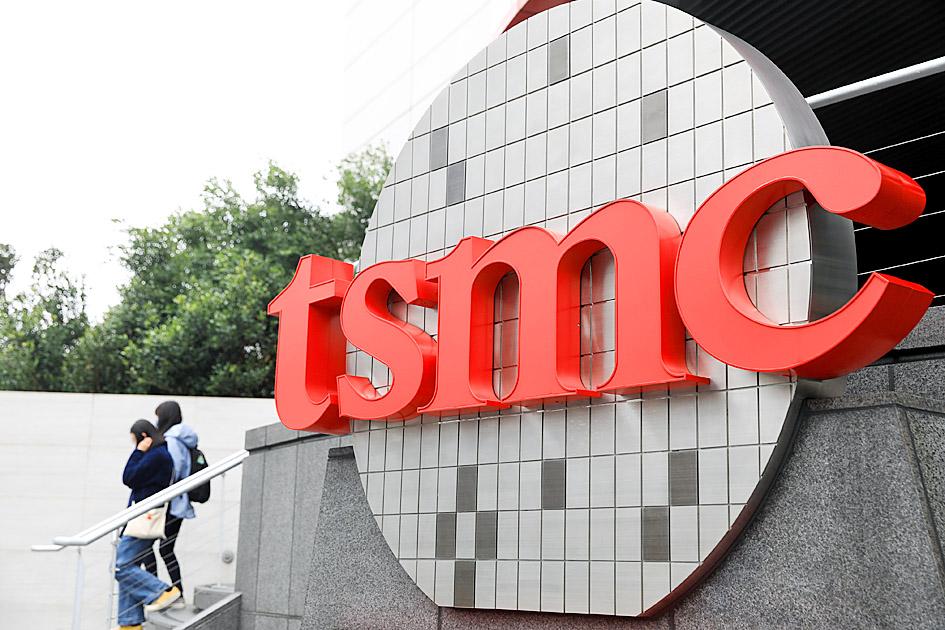Global fab equipment spending at front-end facilities is expected to grow at an annual pace of 10 percent this year to a record of more than US$98 billion, with South Korea taking the lead, followed by Taiwan, SEMI said in a quarterly report yesterday.
That means that world fab equipment spending is to grow for a third straight year, following a 39 percent jump last year and 17 percent growth in 2020, the global semiconductor trade association said in a statement.
The industry previously had three consecutive years of growth from 2016 to 2018, more than 20 years after logging a three-year run in the mid-1990s, SEMI said.

Photo: I-hwa Cheng, Bloomberg
“The semiconductor equipment industry has enjoyed a period of unprecedented growth with increased spending in six of the past seven years as chipmakers expand capacity to meet secular demand for a wide range of emerging technologies, including artificial intelligence, autonomous machines and quantum computing,” SEMI president and chief executive officer Ajit Manocha said in the statement.
“The capacity buildout extends beyond the robust demand during the [COVID-19] pandemic for electronics vital for remote work and learning, telehealth and other applications,” Manocha said.
A bulk of the fab equipment spending is expected to be from the foundry sector, accounting for 46 percent of total spending this year, SEMI said.
The sector is to invest 13 percent more on fab equipment this year than last year, the report said.
The memory sector was next with a 37 percent share, but investment is expected to shrink slightly this year, mostly from DRAM chipmakers, it said.
With Samsung Electronics Co and HK Hynix Inc, South Korea is to be the top spender this year, with fab equipment investment rising 14 percent year-on-year, it said.
Taiwan, which is home to the world’s largest foundry company, Taiwan Semiconductor Manufacturing Co (TSMC, 台積電), ranked No. 2, with fab equipment spending to rise 14 percent annually, SEMI said.
TSMC is expected to unveil another record in capital expenditure for this year today, amounting to US$38 billion, as it has multiple capacity expansion projects under way in Taiwan, China, Japan and the US, Goldman Sachs said last week.
That would be an increase of 26 percent from TSMC’s capital spending budget of US$30 billion last year.
Shares of TSMC’s equipment suppliers Scientech Corp (辛耘), Marketech International Corp (帆宣) and Trusval Technology Co (信紘科技) yesterday rallied 9.71 percent, 2.59 percent and 9.97 percent to NT$113, NT$178.5 and NT$87.1 respectively.
China’s ranking dropped one notch to third this year, with fab equipment spending to contract 20 percent this year from last year, SEMI said.
Europe and the Middle East are projected to grow 145 percent this year from last year, while Japan is expected to grow 29 percent.
SEMI listed 27 fabs and lines that began procuring equipment last year, most of them in China and Japan.
Twenty-five are expected to begin procuring this year, with Taiwan, South Korea and China accounting for most of the activity, it said.

POWERING UP: PSUs for AI servers made up about 50% of Delta’s total server PSU revenue during the first three quarters of last year, the company said Power supply and electronic components maker Delta Electronics Inc (台達電) reported record-high revenue of NT$161.61 billion (US$5.11 billion) for last quarter and said it remains positive about this quarter. Last quarter’s figure was up 7.6 percent from the previous quarter and 41.51 percent higher than a year earlier, and largely in line with Yuanta Securities Investment Consulting Co’s (元大投顧) forecast of NT$160 billion. Delta’s annual revenue last year rose 31.76 percent year-on-year to NT$554.89 billion, also a record high for the company. Its strong performance reflected continued demand for high-performance power solutions and advanced liquid-cooling products used in artificial intelligence (AI) data centers,

SIZE MATTERS: TSMC started phasing out 8-inch wafer production last year, while Samsung is more aggressively retiring 8-inch capacity, TrendForce said Chipmakers are expected to raise prices of 8-inch wafers by up to 20 percent this year on concern over supply constraints as major contract chipmakers Taiwan Semiconductor Manufacturing Co (TSMC, 台積電) and Samsung Electronics Co gradually retire less advanced wafer capacity, TrendForce Corp (集邦科技) said yesterday. It is the first significant across-the-board price hike since a global semiconductor correction in 2023, the Taipei-based market researcher said in a report. Global 8-inch wafer capacity slid 0.3 percent year-on-year last year, although 8-inch wafer prices still hovered at relatively stable levels throughout the year, TrendForce said. The downward trend is expected to continue this year,

Vincent Wei led fellow Singaporean farmers around an empty Malaysian plot, laying out plans for a greenhouse and rows of leafy vegetables. What he pitched was not just space for crops, but a lifeline for growers struggling to make ends meet in a city-state with high prices and little vacant land. The future agriculture hub is part of a joint special economic zone launched last year by the two neighbors, expected to cost US$123 million and produce 10,000 tonnes of fresh produce annually. It is attracting Singaporean farmers with promises of cheaper land, labor and energy just over the border.

US actor Matthew McConaughey has filed recordings of his image and voice with US patent authorities to protect them from unauthorized usage by artificial intelligence (AI) platforms, a representative said earlier this week. Several video clips and audio recordings were registered by the commercial arm of the Just Keep Livin’ Foundation, a non-profit created by the Oscar-winning actor and his wife, Camila, according to the US Patent and Trademark Office database. Many artists are increasingly concerned about the uncontrolled use of their image via generative AI since the rollout of ChatGPT and other AI-powered tools. Several US states have adopted